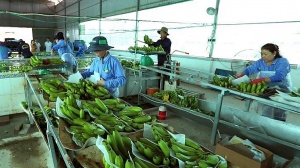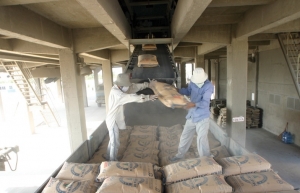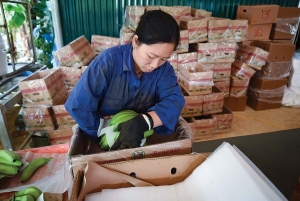US tasting the fruits of Vietnam’s labour
 |
| Grapefruit is the seventh Vietnamese fruit to be sold in the United States ,Photo: Dinh Tung |
Jennifer Moffitt, Under-Secretary for Marketing and Regulatory Programmes at the US Department of Agriculture, and Alexis Taylor, Under-Secretary for Trade and Foreign Agricultural Affairs at the same department, visited Vietnam last week to look at agricultural production, including grapefruit growing. Both senior officials play an important role in allowing Vietnamese agricultural products to be exported to the US.
While eating some grapefruit at a farm in Hanoi’s Hoai Duc district, the two officials were surprised at being told the fruit had been harvested nearly two months ago but still remained fresh without any preservatives used.
In October 2022, the US officially allowed Vietnam to export fresh grapefruits to its market with stringent requirements on food safety and hygiene. Grapefruit is the seventh Vietnamese fruit to be sold in the US, after mango, longan, litchi, dragon fruit, rambutan, and star apple.
Also last October, Vietnam’s first 100 tonnes of grapefruits were exported to the US from the Mekong Delta province of Ben Tre. The batch was split into six containers, with four exported by air and two by sea.
“The US is one of the most demanding markets in the world but has a large demand for fresh fruit,” said Vietnamese Deputy Minister of Agriculture and Rural Development Tran Thanh Nam.
Taylor revealed that Vietnam is discussing how to export coconut and passion fruit to the US. In principle, exports of fresh fruit need to meet strict requirements in food safety and hygiene, so no unusual germs can penetrate the US market from Vietnam and vice versa.
It is calculated that the US market consume about 12 million tonnes of fruit a year. Domestic produce can meet 70 per cent of demand, and the remaining or 3.6 million tonnes must be imported.
Marc Knapper, US Ambassador to Vietnam, believes that US-Vietnam trade ties would continue flourishing thanks to both sides’ growing demand. “The United States and our business community are firmly committed to the ongoing transformation of Vietnam’s economy as well as the growth of our broader bilateral relations,” Knapper told VIR.
“Since the establishment of the US-Vietnam Comprehensive Partnership in 2013, bilateral trade between our countries has quadrupled. The United States has become Vietnam’s largest export market, and Vietnam is also a promising market for US exporters. We see tremendous opportunities in Vietnam for US goods and services in fields such as agriculture, aviation, education, energy, health, and information communications technology, just to name a few,” he added.
Vietnam’s Ministry of Industry and Trade said that Vietnam-US bilateral trade has witnessed a spectacular rise from $450 million in 1995 to $123.7 billion last year.
The two-way figure in the first two months of 2023 touched $15 billion, including Vietnam’s exports of $13.1 billion, down 21 per cent on-year, largely due to the Lunar New Year taking place in January when most businesses halted exports.
“The nature of trade between the United States and Vietnam is also becoming more diverse, as our two countries are increasingly linked through global supply chains. US-made semiconductors are assembled and packaged in Vietnam for export worldwide. US hardwood, cotton, and animal feed fuel Vietnam’s production of furniture, apparel, and seafood, which in turn reach varied markets around the globe,” Knapper said.
As of February 20, total US registered investment capital in Vietnam reached $11.42 billion over 1,223 projects, making the US the 11th biggest foreign investor in Vietnam, according to the Vietnamese Ministry of Planning and Investment.
During Prime Minister Pham Minh Chinh’s visit to the US last May, enterprises from both nations exchanged many cooperation deals and trade contracts, worth over $30 billion.
“US companies and investors bring high-quality products and state-of-the-art technologies, services, and business practices to Vietnam. We partner with Vietnam to develop high-tech, innovative industries,” said Adam Sitkoff, executive director of the American Chamber of Commerce in Hanoi.
“The US business community is optimistic about Vietnam’s prospects for continued strong economic growth in 2022 and beyond, despite global headwinds. Vietnam has done an extremely effective job at managing global challenges – from the continuing pandemic and sharp downturn in the global economy to inflation in key inputs.”
Vietnamese Ambassador to the US Nguyen Quoc Dung recommended that Vietnam should maintain high-level relations with the US to enhance partnership momentum, develop key exports, and create more favourable conditions for US products to enter Vietnam.
“The sectors that US businesses hope to cooperate in include high technology, energy, agriculture, healthcare and pharma, finance, aviation, and tourism,” he said.
 | Fruit exports to China increase sharply As one of the main markets for Vietnamese fruit and vegetables, the recovery of exports to China will contribute to boosting Vietnam's fruit and vegetable industry in 2023. |
 | Promotion of exports to be based on global demand Prime Minister Pham Minh Chinh has emphasised that the industry and trade sector needs to diversify its exports, take the fullest advantage of opportunities from new-generation free trade agreements (FTAs), and produce high-demand products, aiming to reach the target of 6 per cent growth in export value this year. |
 | Cement exports under duress from neighbours The removal of a levy on imported cement in the Philippines could encourage Vietnamese exporters to engage in new ventures alongside Thailand. |
 | Uplift in processed fruit and veg sector Processed fruit and vegetables are making up a growing percentage of fruit and vegetable exports, leading to potential for increased investment in the sector. |
 | Minister of Industry and Trade lays out five goals to boost exports The Vietnam Trade Office has said that it is prepared to assist Vietnamese businesses in exporting products to international markets, as import and export turnover for the first two months of 2023 fell 13.2 per cent on year to $96.06 billion. |
What the stars mean:
★ Poor ★ ★ Promising ★★★ Good ★★★★ Very good ★★★★★ Exceptional
 Tag:
Tag:
Related Contents
Latest News
More News
- US firms deepen energy engagement with Vietnam (February 05, 2026 | 17:23)
- Vietnam records solid FDI performance in January (February 05, 2026 | 17:11)
- Site clearance work launched for Dung Quat refinery upgrade (February 04, 2026 | 18:06)
- Masan High-Tech Materials reports profit: a view from Nui Phao mine (February 04, 2026 | 16:13)
- Hermes joins Long Thanh cargo terminal development (February 04, 2026 | 15:59)
- SCG enhances production and distribution in Vietnam (February 04, 2026 | 08:00)
- UNIVACCO strengthens Asia expansion with Vietnam facility (February 03, 2026 | 08:00)
- Cai Mep Ha Port project wins approval with $1.95bn investment (February 02, 2026 | 16:17)
- Repositioning Vietnam in Asia’s manufacturing race (February 02, 2026 | 16:00)
- Manufacturing growth remains solid in early 2026 (February 02, 2026 | 15:28)






















 Mobile Version
Mobile Version